Canada is entering a golden age of innovation with an influx of new money and a reputation for AI expertise. As Silicon Valley becomes outrageously overpriced, tech giants and startups are flocking to Canada as an affordable alternative. In fact, over the last five years, Canada added more tech jobs than Silicon Valley.
“The Canadian tech ecosystem has soared to new highs with funding rounds reaching new records. The Canadian Venture Capital Association reported over $4.5bn across 196 deals in the first quarter of 2022,” Bonnie Chau, portfolio manager of BCF Ventures, the corporate venturing arm of law firm BCF, told Global Corporate Venturing.

Bonnie Chau, portfolio manager, BCF Ventures
More money is coming into the system following the government’s announcement last week of a new $450m fund of funds called VCCI (Venture Capital Catalyst Initiative), expected to seed a substantial number of Canada’s venture funds with public money.
Corporate investors are also becoming increasingly active in the system, with a record $4.8bn invested in 2021. That said, there are still relatively few active CVC funds in the region and they are poorly understood. Unless the CVC ecosystem develops, corporations could end up missing out on Canada’s tech boom.
AI expertise
“Canada is recognised as the worldwide artificial intelligence epicentre because of the presence of the top global AI deep-learning pioneers,” said Sergio Escobar, managing director for BCF Ventures.

Sergio Escobar, managing director, BCF Ventures
“Canada’s leading position is also supported by the country’s national AI strategy and talent value proposition. Canada’s ecosystem includes more than 800 AI companies and 670 AI startups. Montreal has the highest concentration of scientists and students of deep learning in the world, while Toronto has the highest concentration of AI startups.”
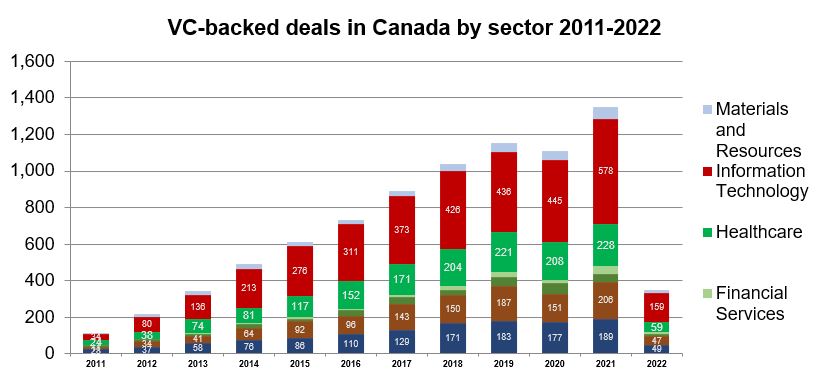

VC-backed deals in Canada by sector 2011-2022 – source: PitchBook
Five innovation superclusters
Apart from AI, Canada is known for its diverse tech scene, Chau said. “The country has also a mosaic of distinctive ecosystems, many of which are unique in the world. We have five leading innovation superclusters regrouping academia, scientist and the private sector spaced throughout the country.”
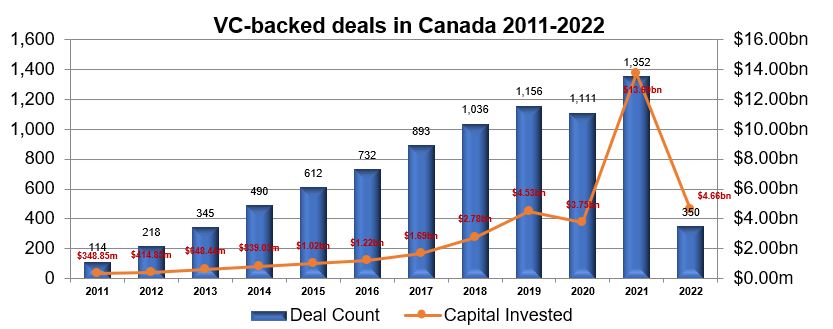

VC-backed deals in Canada – source: PitchBook.
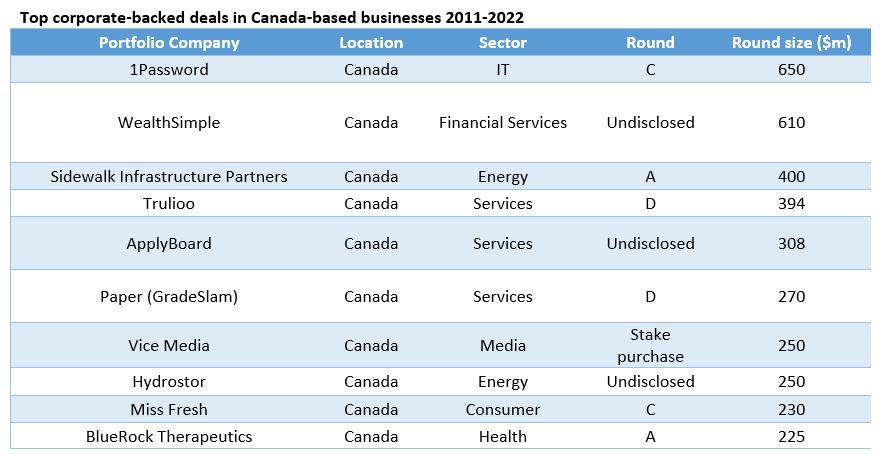
Top corporate-backed deals in Canada-based businesses 2011-2022 – source: PitchBook.
Chau continued: “These high-tech hubs are in Ontario for the advanced manufacturing, Nova Scotia for the ocean supercluster, Quebec for AI, Alberta and Saskatchewan for the protein industries, and British Columbia for health and digital technology.
“Canada’s diverse, highly educated, and growing tech talent pool continuously attracts investments from global businesses, including the world’s 10 largest technology companies. With more than 2.8 million STEM graduates and the world’s highest educated workforce, the depth and quality of Canada’s tech talent pool are undeniable.
“On top of that, Canada’s friendly immigration policies implemented the ‘Global Skills Programme’ aiming to bring in highly skilled workforce in as little as two weeks.”

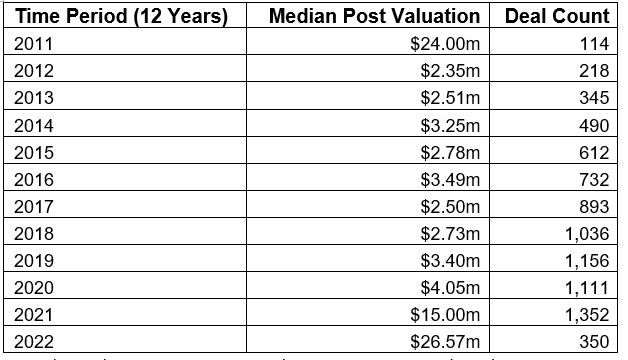
Canada median VC post-money valuation – source: PitchBook.
Although Silicon Valley in the US remains the mecca of the global tech ecosystem, Canada provides a more affordable alternative, according to Escobar. “Everyone knows Silicon Valley has become outrageously expensive to live and there is a huge lack of talent to build and grow a technology-based company. Canada is a much more cost-effective alternative for tech giants and startups.
“Over the last five years, Canada had added more tech jobs than Silicon Valley.”
Canada is among the global innovation leaders, according to the Global Innovation Index (GII) 2021, a report produced jointly by Cornell University, INSEAD and the World Intellectual Property Organisation. The country took the 16th place in the GII global ranking, coming first in market sophistication and fifth in institutions.
Corporate investment trends
Corporate investors have also been taking note. Last year saw corporate funding in Canada-based companies reach the highest ever point since GCV began collecting corporate venturing data, with GCV Analytics logging $4.8bn across 94 deals, up from $913m across 56 deals the previous year.
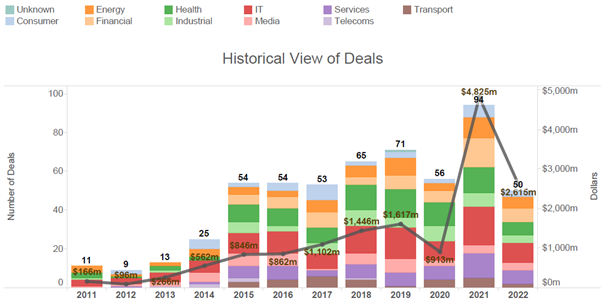
Corporate-backed deals in Canada-based businesses 2011-2022 – source: GCV Analytics.
Deals backed by Canadian corporate venturers likewise hit an all-time high in 2021, with corporates investing $7.8bn across 80 deals, representing a sharp increase from the nearly $3.5bn across 50 deals a year earlier.

In terms of the number of deals involving Canadian corporate investors, GCV Analytics has tracked 199 deals in the US and 163 in Canada since records began in 2011, indicating a strong focus on their home turf and its closest neighbour.
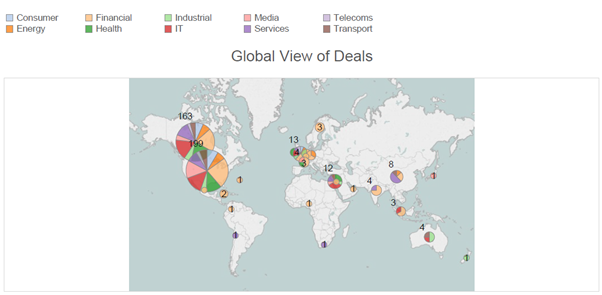
Global view of deals backed by Canada-based corporates 2011-2022 – source: GCV Analytics.
Most active corporate investors
Telecommunications firm Telus, enterprise software provider Salesforce, financial services firm Fidelity, chipmaker Intel and internet technology group Alphabet are among the most prolific corporate venturers in Canada when it comes to number of deals, as are energy group Chevron, software producer Microsoft and Workday, which provides financial and human resources management platforms.
Internet and telecoms conglomerate SoftBank, insurer Allianz, financial services provider Citigroup and internet and gaming technology group Tencent are also among the top corporate investors when considering the deal volume.
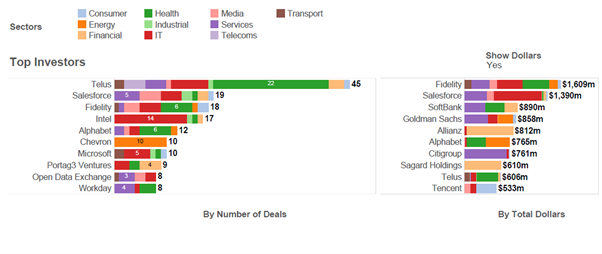
Top corporate investors in Canada-based businesses 2011-2022 – source: GCV Analytics.
Corporate exits involving Canada-based businesses hit a record high in 2020 both in number and volume, with GCV Analytics logging $2.2bn across 13 exits, but went down to $1.4bn across 10 exits the year after.
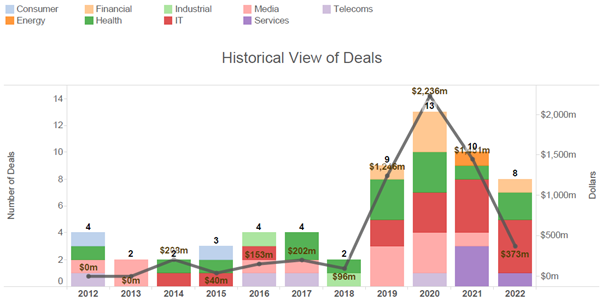
Corporate exits from Canada-based startups 2011-2022 – source: GCV Analytics.
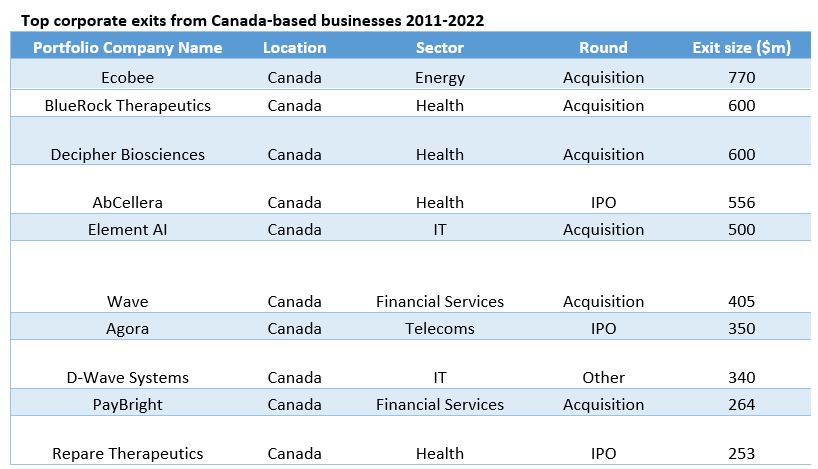
Top corporate exits from Canada-based businesses 2011-2022 – source: PitchBook
Talent war hits Canadian El Dorado
Due to Canada’s friendly immigration system for highly skilled workers, Escobar noted, the country has experienced a dramatic “brain gain” of tech workers coming from the US and Europe. He said: “Many US and European tech giants have landed to take advantage of this ‘Canadian El Dorado’. Canada is now rated as North America’s fastest-growing job market.
“While the Canadian tech sector is red-hot right now, this situation has generated a dramatic increase in valuations (that is, more than 40-times yearly sales) as well as an increased competition within investors. On the other side, Canadian startups have also been struggling to scale and retain talent as engineers tend to leave to join the tech giants for higher salaries and better conditions.
“In this context of high valuations and the war on talent, rather than aggressively competing on deals considered super expensive on valuations with other funds, our corporate VC fund has remained prudent by implementing a multi-stage strategy to reinvest in its existing portfolio of companies.”
BCF Ventures focuses on pre-seed to series B-stages, noted Chau. “To date, this strategy has been super effective on metrics related to financial returns for the fund and has proven to be resistant against ups and downs from the market.”
CVC education needed
Despite the rising number of deals, corporate venture capital funds are still rare in Canada, Escobar said. “Most of them work isolated and are quite discreet in their activities, so the ecosystem requires a lot of education to understand the difference between a traditional financial VC fund versus a corporate VC fund.”
BCF Ventures, for example, has deployed a variety of initiatives to educate stakeholders across the country, said Chau. “We partnered with Canadian accounting firm MNP to deploy a nationwide pitch competition putting entrepreneurs in face of global CVCs and VCs.”
Escobar added: “We also created the Corporate Innovation Programme with the goal to accelerate AI-based startups with Canada’s Scale AI supercluster – a co-investment and innovation hub with government funding matched by contributions from the private sector.
“Thanks to this initiative and many others from the Supercluster Scale AI, they finance Canadian corporations to deploy commercial POCs with startups to foster innovation. We also partnered with Founder Institute pre-seed accelerator to foster the incubation of AI-supply chain based companies. Lastly, our team actively mentors with Canadian startup accelerator programmes like Creative Destruction Lab in AI and supply chain.”
Challenges and Opportunities
By Bonnie Chau and Sergio Escobar
Canada had a vibrant early ecosystem of CVCs from pension funds, banks, telcos and OEMs prior to the 2010s financial crisis but lack of meaningful financial returns, lack of experienced managers and employee churn led those corporations to close their units.
Canadian corporations took close to 10 years to slowly reignite the practice of having CVC units. Over the last decade, global corporate VC funds from the US, Japan, South Korea and Europe were the ones taking advantage of this fertile land by investing and acquiring Canadian startups with incredible success.
But in the last year, three big “interesting” CVCs have been deployed in Canada with funds of more than $100m in size. They are Deloitte Canada Ventures ($150m, January 2022), Thomson Reuters Ventures ($100m, October 2021), and Spin Master Ventures ($100m, October 2021).
BCF Ventures has been testing the CVC-as-a-service model to support corporations in their efforts to launch Canada-based CVC units. We need to revive the Canadian CVC ecosystem. The ball is certainly in our court to double down on our success. Canada’s tech sector is booming right now. If we don’t nurture and develop our Canadian CVC ecosystem to link Canadian corporations with startups, we could be at the edge of Canada’s biggest tech drain of talent and intellectual property.
